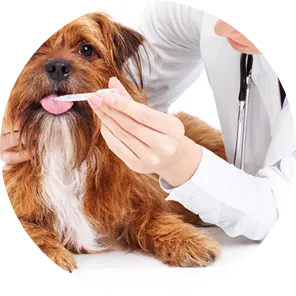Blog

How to Recognize and Manage Pet Allergies
Introduction
Pets bring joy and companionship, but for some people, they can also bring sneezing, itching, and other allergy symptoms. Pet allergies are a common problem, but with the right knowledge and strategies, you can manage them effectively without giving up on your furry friends.
Read on to discover how to identify pet allergy symptoms and implement practical solutions!
What Are Pet Allergies?
Pet allergies occur when your immune system overreacts to proteins found in a pet’s skin cells, saliva, or urine. These reactions often manifest as sneezing, runny nose, or skin irritation.
Common allergens include:
Pet dander (tiny flakes of skin)
Saliva from dogs and cats
Urine proteins
Signs and Symptoms of Pet Allergies
Respiratory Symptoms:
Sneezing
Nasal congestion
Wheezing or shortness of breath
Skin Symptoms:
Itchy, red, or watery eyes
Skin rashes or hives after pet contact
Other Symptoms:
Persistent coughing
Fatigue or general malaise
How to Confirm You Have a Pet Allergy
If you suspect a pet allergy, consult an allergist. They may perform:
Skin Prick Tests: Identifies allergic reactions to specific substances.
Blood Tests: Measures your immune system’s response to allergens.
Effective Ways to Manage Pet Allergies
Reduce Exposure to Allergens
Create pet-free zones, such as your bedroom.
Use HEPA air purifiers to filter allergens.
Wash your hands after handling pets.
Clean Your Home Regularly
Vacuum frequently using a vacuum with a HEPA filter.
Wash pet bedding and toys often.
Keep furniture and curtains clean to minimize dander buildup.
Groom Your Pets
Bathe pets weekly with veterinarian-approved shampoos.
Brush them outside to reduce shedding and dander.
Consider Allergy Medications
Antihistamines can reduce sneezing and itching.
Nasal sprays may help alleviate nasal congestion.
Explore Immunotherapy (Allergy Shots)
A long-term solution that helps your body build tolerance to allergens.
Balancing Allergies and Pet Ownership
Managing pet allergies doesn’t necessarily mean rehoming your beloved pet. By taking proactive steps, you can reduce symptoms and continue enjoying the companionship of your furry friends.
Conclusion
Pet allergies can be challenging, but they are manageable with the right strategies. By identifying your triggers and implementing solutions, you can create a harmonious environment for both you and your pet.

How to Recognize and Manage Pet Allergies
Introduction
Pets bring joy and companionship, but for some people, they can also bring sneezing, itching, and other allergy symptoms. Pet allergies are a common problem, but with the right knowledge and strategies, you can manage them effectively without giving up on your furry friends.
Read on to discover how to identify pet allergy symptoms and implement practical solutions!
What Are Pet Allergies?
Pet allergies occur when your immune system overreacts to proteins found in a pet’s skin cells, saliva, or urine. These reactions often manifest as sneezing, runny nose, or skin irritation.
Common allergens include:
Pet dander (tiny flakes of skin)
Saliva from dogs and cats
Urine proteins
Signs and Symptoms of Pet Allergies
Respiratory Symptoms:
Sneezing
Nasal congestion
Wheezing or shortness of breath
Skin Symptoms:
Itchy, red, or watery eyes
Skin rashes or hives after pet contact
Other Symptoms:
Persistent coughing
Fatigue or general malaise
How to Confirm You Have a Pet Allergy
If you suspect a pet allergy, consult an allergist. They may perform:
Skin Prick Tests: Identifies allergic reactions to specific substances.
Blood Tests: Measures your immune system’s response to allergens.
Effective Ways to Manage Pet Allergies
Reduce Exposure to Allergens
Create pet-free zones, such as your bedroom.
Use HEPA air purifiers to filter allergens.
Wash your hands after handling pets.
Clean Your Home Regularly
Vacuum frequently using a vacuum with a HEPA filter.
Wash pet bedding and toys often.
Keep furniture and curtains clean to minimize dander buildup.
Groom Your Pets
Bathe pets weekly with veterinarian-approved shampoos.
Brush them outside to reduce shedding and dander.
Consider Allergy Medications
Antihistamines can reduce sneezing and itching.
Nasal sprays may help alleviate nasal congestion.
Explore Immunotherapy (Allergy Shots)
A long-term solution that helps your body build tolerance to allergens.
Balancing Allergies and Pet Ownership
Managing pet allergies doesn’t necessarily mean rehoming your beloved pet. By taking proactive steps, you can reduce symptoms and continue enjoying the companionship of your furry friends.
Conclusion
Pet allergies can be challenging, but they are manageable with the right strategies. By identifying your triggers and implementing solutions, you can create a harmonious environment for both you and your pet.
Testimonial
What They Say
Was looking for a new Veterinarian and very happy with Walker Vet Hospital! Customer service, informative, and compassionate with staff and doctors. Give a 10 out of 10. Taking all three of my dogs there happily.


Rae W.
Good value and knowledgeable. No waiting most of the time. Always 2-3 doctors at a time and weekend care available which is appreciated. All of our three dogs been going to Walker Vet for some time now. Never any complaints.


Nick G.

Review Us!
